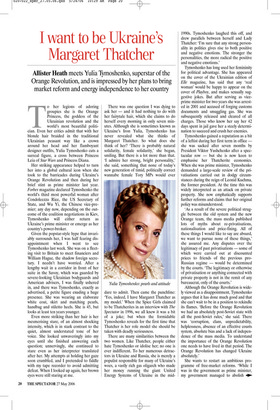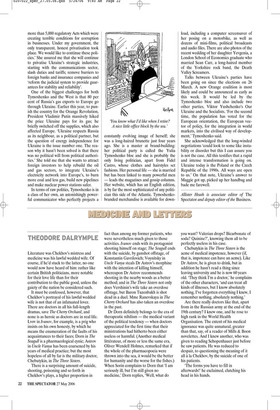I want to be Ukraine’s Margaret Thatcher
Allister Heath meets Yulia Tymoshenko, superstar of the Orange Revolution, and is impressed by her plans to bring market reform and energy independence to her country To her legions of adoring groupies she is the Orange Princess, the goddess of the Ukrainian revolution and the world’s most beautiful politician. Even her critics admit that with her blonde hair braided in the traditional Ukrainian peasant way like a crown around her head and her flamboyant designer outfits, Yulia Tymoshenko cuts a surreal figure, a cross between Princess Leia of Star Wars and Princess Diana.
Her striking appearance helped to turn her into a global cultural icon when she took to the barricades during Ukraine’s Orange Revolution and then during her brief stint as prime minister last year. Forbes magazine declared Tymoshenko the world’s third most powerful woman after Condoleezza Rice, the US Secretary of State, and Wu Yi, the Chinese vice-premier; any day now, depending on the outcome of the coalition negotiations in Kiev, Tymoshenko will either return as Ukraine’s prime minister or emerge as her country’s power-broker.
Given the popstar-style hype that invariably surrounds her, I was half fearing disappointment when I went to see Tymoshenko last week. She was on a fleeting visit to Britain to meet financiers and William Hague, the shadow foreign secretary. I needn’t have worried. After a lengthy wait in a corridor in front of her suite in the Savoy, which was guarded by severe-looking Ukrainian bodyguards and American advisers, I was finally ushered in, and there was Tymoshenko, exactly as advertised, a petite figure exuding a huge presence. She was wearing an elaborate white coat, skirt and matching pearls, handbag and stiletto heels. She is 45, but looks at least ten years younger.
Even more striking than her hair is her mesmerising stare, of an almost shocking intensity, which is in stark contrast to the quiet, almost understated tone of her voice. She looked unwaveringly into my eyes until she finished answering each question; unnervingly, she continued to stare even as her interpreter translated after her. My attempts at holding her gaze soon crumbled, and I pretended to fiddle with my tape recorder to avoid admitting defeat. When I looked up again, her brown eyes were still staring at me. There was one question I was dying to ask her — and it had nothing to do with her fairytale hair, which she claims to do herself every morning in only seven minutes. Although she is sometimes known as Ukraine’s Iron Yulia, Tymoshenko has never revealed what she thinks of Margaret Thatcher. So what does she think of her? ‘There is probably natural solidarity, female solidarity,’ she began, smiling. But there is a lot more than that. ‘I admire her strong, bright personality,’ she said, something that none of today’s new generation of timid, politically correct wannabe female Tory MPs would ever dare to admit. Then came the punchline: ‘Yes, indeed, I have Margaret Thatcher as my model.’ When the Spice Girls claimed to be Thatcherites in an interview with The Spectator in 1996, we all knew it was a bit of a joke; but when the formidable Tymoshenko reveals for the first time that Thatcher is her role model she should be taken with deadly seriousness.
There are many similarities between the two women. Like Thatcher, people either hate Tymoshenko or idolise her; no one is ever indifferent. To her numerous detractors in Ukraine and Russia, she is merely a populist responsible for many of Ukraine’s woes, a vastly rich gas oligarch who made her money running the giant United Energy Systems of Ukraine in the mid 1990s. Tymoshenko laughed this off, and drew parallels between herself and Lady Thatcher: ‘I’m sure that any strong personality in politics gives rise to both positive and negative emotions. The stronger the personalities, the more radical the positive and negative emotions.’ Tymoshenko has long used her femininity for political advantage. She has appeared on the cover of the Ukrainian edition of Elle magazine, has said that any ‘real woman’ would be happy to appear on the cover of Playboy, and makes sexually suggestive jokes. But after serving as viceprime minister for two years she was arrested in 2001 and accused of forging customs documents and smuggling gas. She was subsequently released and cleared of all charges. Those who know her say her 42 days spent in jail gave her a steely determination to succeed and crush her enemies.
Tymoshenko gained a reputation as a bit of a leftist during her first term in office she was sacked after seven months by President Viktor Yushchenko after a spectacular row — but she is now keen to emphasise her Thatcherite economics. When she was prime minister, Tymoshenko demanded a large-scale review of the privatisations carried out in dodgy circumstances during the reign of Leonid Kuchma, the former president. At the time this was widely interpreted as an attack on private property. She now emphatically supports further reforms and claims that her original policy was misunderstood.
‘As a result of the severe political struggle between the old system and the new Orange team, the mass media published lots of myths about re-privatisations, nationalisation and price-fixing. All of these things I would like to say are absurd, we want to pursue none of these things,’ she assured me. Any disputes over the legitimacy of past privatisations — some of which were carried out at discounted prices to friends of the previous proRussian regime — would be determined by the courts. ‘The legitimacy or otherwise of privatisation or anything connected with private property is not in the remit of any bureaucrat, only of the courts.’ Although the Orange Revolution is widely viewed as a disappointment, Tymoshenko argues that it has done much good and that she can’t wait to be in a position to rekindle its flames. ‘Before the Orange Revolution we had an absolutely post-Soviet state with all the post-Soviet rules,’ she said. There was ‘corruption, clans, unpredictability, helplessness, absence of an effective courts system, absolute bias and a lack of independence of the mass media. To understand the importance of the Orange Revolution one needs to have lived in that period. The Orange Revolution has changed Ukraine absolutely.’ She wants to restart an ambitious programme of free-market reforms. ‘While I was in the government as prime minister, my government managed to abolish more than 5,000 regulatory Acts which were creating terrible conditions for corruption in businesses. Under my government, the only transparent, honest privatisation took place. We would like to continue these policies.’ She assured me that she will continue to privatise Ukraine’s strategic industries, starting with the communications sector, slash duties and tariffs; remove barriers to foreign banks and insurance companies and ‘reform the judicial system to provide guarantees for stability and reliability’.
One of the biggest challenges for both Tymoshenko and the West is that 80 per cent of Russia’s gas exports to Europe go through Ukraine. Earlier this year, to punish the country for the Orange Revolution, President Vladimir Putin massively hiked the price Ukraine pays for its gas; he briefly switched off the supplies, which also affected Europe. ‘Ukraine respects Russia as its neighbour, as a political partner, but the question of energy independence for Ukraine is the issue number one. The reason why it hasn’t been solved is that there was no political will from political authorities.’ She told me that she wants to attract foreign investors to help rebuild the oil and gas sectors, to integrate Ukraine’s electricity network into Europe’s, to burn more coal and less gas, build new pipelines and make nuclear power stations safer.
In terms of raw politics, Tymoshenko is in a class of her own, an astonishingly powerful communicator who perfectly projects a constantly evolving image of herself; she was a long-haired brunette just four years ago. She is a master at brand-building: her political party is called the Yulia Tymoshenko bloc and she is probably the only living politician, apart from Fidel Castro, whose clothes and hairstyles set fashions. Her personal life — she is married but has been linked to many powerful men — leads the magazines and gossip columns. Her website, which has an English edition, is by far the most sophisticated of any politician this side of the Atlantic. Tymoshenkobranded merchandise is available for down load, including a computer screensaver of her posing on a motorbike, as well as dozens of mini-films, political broadcasts and audio files. There are also photos of the recent wedding of her daughter Yevgenia, a London School of Economics graduate who married Sean Carr, a long-haired member of the Yorkshire rock band, the Death Valley Screamers.
Talks between Ukraine’s parties have been going on since the elections on 26 March. A new Orange coalition is most likely and could be announced as early as this week. It would be led by the Tymoshenko bloc and also include two other parties, Viktor Yushchenko’s Our Ukraine and the Socialists. ‘For the second time, the population has voted for the European orientation, the European vector of policy, for the integration in world markets, into the civilised way of development,’ Tymoshenko said.
She acknowledged that the long-winded negotiations ‘could look to some like instability or disorder but this I can assure you is not the case. All this testifies that a rapid and intense transformation is going on. Ukraine today is the Poland or the Czech Republic of the 1990s. All ways are open to us.’ On that note, Ukraine’s answer to Maggie got up, picked up her handbag and bade me farewell.
Allister Heath is associate editor of The Spectator and deputy editor of the Business.











































































































 Previous page
Previous page